Categories
- Antiques & Collectibles 13
- Architecture 36
- Art 48
- Bibles 22
- Biography & Autobiography 815
- Body, Mind & Spirit 144
- Business & Economics 28
- Children's Books 18
- Children's Fiction 14
- Computers 4
- Cooking 94
- Crafts & Hobbies 4
- Drama 346
- Education 58
- Family & Relationships 59
- Fiction 11834
- Games 19
- Gardening 17
- Health & Fitness 34
- History 1378
- House & Home 1
- Humor 147
- Juvenile Fiction 1873
- Juvenile Nonfiction 202
- Language Arts & Disciplines 89
- Law 16
- Literary Collections 686
- Literary Criticism 179
- Mathematics 13
- Medical 41
- Music 40
- Nature 179
- Non-Classifiable 1768
- Performing Arts 7
- Periodicals 1453
- Philosophy 65
- Photography 2
- Poetry 896
- Political Science 203
- Psychology 44
- Reference 154
- Religion 515
- Science 126
- Self-Help 85
- Social Science 83
- Sports & Recreation 34
- Study Aids 3
- Technology & Engineering 59
- Transportation 23
- Travel 463
- True Crime 29
Our website is made possible by displaying online advertisements to our visitors.
Please consider supporting us by disabling your ad blocker.
The Book of American Negro Poetry
Description:
Excerpt
PREFACE
There is, perhaps, a better excuse for giving an Anthology of American Negro Poetry to the public than can be offered for many of the anthologies that have recently been issued. The public, generally speaking, does not know that there are American Negro poets—to supply this lack of information is, alone, a work worthy of somebody's effort.
Moreover, the matter of Negro poets and the production of literature by the colored people in this country involves more than supplying information that is lacking. It is a matter which has a direct bearing on the most vital of American problems.
A people may become great through many means, but there is only one measure by which its greatness is recognized and acknowledged. The final measure of the greatness of all peoples is the amount and standard of the literature and art they have produced. The world does not know that a people is great until that people produces great literature and art. No people that has produced great literature and art has ever been looked upon by the world as distinctly inferior.
The status of the Negro in the United States' is more a question of national mental attitude toward the race than of actual conditions. And nothing will do more to change that mental attitude and raise his status than a demonstration of intellectual parity by the Negro through the production of literature and art.
Is there likelihood that the American Negro will be able to do this? There is, for the good reason that he possesses the innate powers. He has the emotional endowment, the originality and artistic conception, and, what is more important, the power of creating that which has universal appeal and influence.
I make here what may appear to be a more startling statement by saying that the Negro has already proved the possession of these powers by being the creator of the only things artistic that have yet sprung from American soil and been universally acknowledged as distinctive American products.
These creations by the American Negro may be summed up under four heads. The first two are the Uncle Remus stories, which were collected by Joel Chandler Harris, and the "spirituals" or slave songs, to which the Fisk Jubilee Singers made the public and the musicians of both the United States and Europe listen. The Uncle Remus stories constitute the greatest body of folklore that America has produced, and the "spirituals" the greatest body of folk-song. I shall speak of the "spirituals" later because they are more than folk-songs, for in them the Negro sounded the depths, if he did not scale the heights, of music.
The other two creations are the Cakewalk and ragtime. We do not need to go very far back to remember when cakewalking was the rage in the United States, Europe and South America. Society in this country and royalty abroad spent time in practicing the intricate steps. Paris pronounced it the "poetry of motion." The popularity of the cakewalk passed away but its influence remained. The influence can be seen to-day on any American stage where there is dancing....




